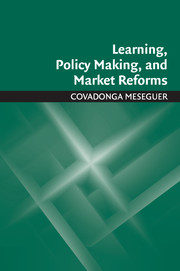1 - The Question
Published online by Cambridge University Press: 18 January 2010
Summary
The task which the loss of the stable state makes imperative, for the person, for our institutions, for society as a whole is to learn about learning.
(Schön 1973, quoted in Freeman 2006)In much of the developing world, the 1980s and 1990s were decades of radical economic change. Whereas in the 1960s and 1970s, the prevailing model of development was based on state intervention and inward-looking policies, the 1980s and 1990s were characterized by the advocacy of market-oriented reforms. These reforms, packaged under the so-called Washington Consensus, aimed at opening up national economies and at reducing the role of the state in the economy. The consensus became so broad that some described the new state of the debate on development as one of “universal convergence” (Williamson 1990, 1994; Biersteker 1995; Rodrik 1996: 9).
The story of the “universal convergence” can be told along the following lines. The model of inward-oriented industrialization, epitomized by the experience of many Latin American countries in the 1960s and 1970s, was a resounding failure. The bias against exports caused enormous balance-of-payment crises. Devaluations, inflation, and fiscal indiscipline became common. Governments borrowed massively from abroad to close the external and fiscal gaps. At the beginning of the 1980s, Mexico's debt moratorium alarmed foreign creditors, who cut off their lending. Without credit to finance chronic fiscal deficits, governments resorted to the printing press, which eventually resulted in hyperinflation and economic stagnation.
- Type
- Chapter
- Information
- Learning, Policy Making, and Market Reforms , pp. 1 - 36Publisher: Cambridge University PressPrint publication year: 2009

